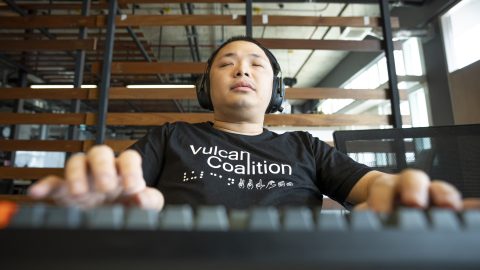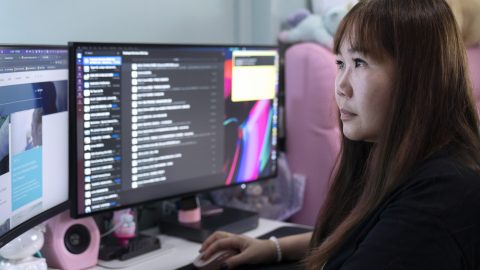Anand Eswaran: Tech may change how we work, but we’ll still have work
Artificial intelligence has captured our collective imagination for decades. But now that the science fiction has evolved into real science, we have begun to wonder what impact technology like AI and machine learning will have on our lives – and especially our jobs. How will we adapt to a workplace shaped by the digital economy? If you’re worried that your skills (or those within your organization) might not remain relevant, you’re not alone.
According to LinkedIn’s 2017 US Emerging Jobs Report survey, a significant percentage of the working population has the same concern. Unsurprisingly, the survey identified jobs in machine learning, data science and big data as among the most important today and in the near future. The need for machine-learning engineers grew nearly tenfold from 2012 through 2017, jobs in data science grew 6.5-fold, and positions in big data and full-stack engineering increased 5.5-fold.
But Microsoft believes that digital transformation will create more jobs than it destroys. Industry has consistently been transformed by technology. From steam power to electricity and now to digital business, human creativity continually improves how companies serve their customers, create new products and markets, overhaul operations or empower their workforce.
Today, businesses are looking to the cloud, artificial intelligence, the Internet of Things, mixed reality and other new technologies to reinvent themselves and their capabilities.
Soft skills in high demand
So what skills should you be looking to develop? According to a Harvard Business Review Analytics Services study that Microsoft commissioned last year, the single most important skill to have in 2020 will be the ability to work with data and analytics. That’s not surprising.
But not every job requires extensive technical skills and training. So-called soft skills will continue to be in demand. These include adaptability, culture fit, leadership, growth potential and ability to prioritize. The ability to collaborate – for instance, in a changing health care market – will still command a premium
As older technologies, such as Java, become less important, non-digital skills will lose ground to skills assisted by technology. Indeed, highly specialized jobs across all fields are being replaced by roles requiring broader skillsets – and by roles requiring the ability to work in human/machine teams.
For example, Microsoft’s own Customer Service & Support organization has introduced a virtual agent that works in tandem with our live support agents to help customers resolve issues. It helps gather customer information and provide live support representatives faster access to answers to common questions, which gives them more time to focus on more complex issues.
Observations from support representatives feed back into the virtual agent, providing it with even better information in a virtuous cycle of cooperation. The results have been tremendous – a 10 percent increase in a customer’s self-solve rate and a 12 to 20 percent reduction of incoming incidents for Windows Consumer and Xbox. I see this as a positive evolution for our organization and a testament to people working with technology – not against it.
In other companies we work with, such reinvention can take many forms. For instance:
- Microsoft’s work with Fullerton Healthcare, in Singapore, puts data directly in the hands of health care practitioners who can use it more efficiently. That saves administrative costs, and that savings lets Fullerton hire more practitioners.
- Automated gathering and analysis of real-time data on temperature, pressure, flow rate and fermentation at Deschutes Brewery in Bend, Oregon, using Microsoft technology, is saving time and freeing employees to work at more productive tasks.
A digital culture to build broad skills and solve more complex tasks
Employers and business leaders have an important role to play in developing the ideal workforce of the future and evolving the corporate culture. Last summer, I shared a Harvard Business Review survey in which a whopping 80 percent of the corporate respondents predicted that digital trends will soon disrupt their industries, if they haven’t already.
What I didn’t address in August were the forces that execs think are most likely to impede those vital changes. The biggest obstacle is retooling the business’ organization and management. Just behind that: resistance to change among managers and workers. That’s right: Insufficient training or reticence among employees can derail a company’s growth strategy.
For organizations, that means that, starting now, it’s essential to provide access to tools, data, training and support to help employees transform their roles and focus on solving more complex tasks. Nearly three-fourths of the highly digitized organizations in the HBR survey said they’re already at work on this task, while far fewer non-digitized organizations – 38 percent – are doing so.
Microsoft believes that no worker should be left behind. All of us – employees, companies and community – have a role to play in bolstering the economy through meaningful work. That starts by demonstrating how digital technology can handle the repetitive, boring tasks and serve as a partner for employees to unlock greater productivity, tackle greater challenges and achieve more for their organizations.
Anand Eswaran is corporate vice-president, Digital, Services and Success. You can follow him on LinkedIn and Twitter.








